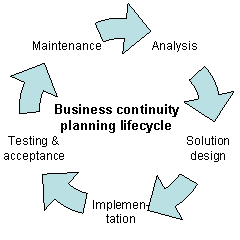An AbEnd is an abnormal termination of software, or a program crash.

Business continuity planning is the process of creating systems of prevention and recovery to deal with potential threats to a company. In addition to prevention, the goal is to enable ongoing operations before and during execution of disaster recovery.
A software development kit (SDK) is a collection of software development tools in one installable package. They facilitate the creation of applications by having compiler, debugger and perhaps a software framework. They are normally specific to a hardware platform and operating system combination. To create applications with advanced functionalities such as advertisements, push notifications, etc; most application software developers use specific software development kits.
LotusScript is an object oriented programming language used by Lotus Notes and other IBM Lotus Software products.
VM is a family of IBM virtual machine operating systems used on IBM mainframes System/370, System/390, zSeries, System z and compatible systems, including the Hercules emulator for personal computers.
Task analysis is the analysis of how a task is accomplished, including a detailed description of both manual and mental activities, task and element durations, task frequency, task allocation, task complexity, environmental conditions, necessary clothing and equipment, and any other unique factors involved in or required for one or more people to perform a given task.
Troubleshooting is a form of problem solving, often applied to repair failed products or processes on a machine or a system. It is a logical, systematic search for the source of a problem in order to solve it, and make the product or process operational again. Troubleshooting is needed to identify the symptoms. Determining the most likely cause is a process of elimination—eliminating potential causes of a problem. Finally, troubleshooting requires confirmation that the solution restores the product or process to its working state.
Veritas Storage Foundation (VSF), previously known as Veritas Foundation Suite, is a computer software product made by Veritas Software that combines Veritas Volume Manager (VxVM) and Veritas File System (VxFS) to provide online-storage management. Symantec Corporation developed and maintained VSF until January 29, 2016, at which point Veritas and Symantec separated. The latest product version, 7.0, was re-branded as "Veritas InfoScale 7.0".
In a computer system or network, a runbook is a compilation of routine procedures and operations that the system administrator or operator carries out. System administrators in IT departments and NOCs use runbooks as a reference.
The IBM SAN Volume Controller (SVC) is a block storage virtualization appliance that belongs to the IBM System Storage product family. SVC implements an indirection, or "virtualization", layer in a Fibre Channel storage area network (SAN).
Tivoli Software encompasses a set of products originally developed by Tivoli Systems Inc. IBM bought the company and ran the operation as its Tivoli Software division. Additional products were acquired and run under the Tivoli portfolio brand. IBM began phasing out use of the Tivoli brand in 2013 and by 2016 had moved the portfolio products into a revised and rebranded hierarchy.

In computing, fc is a command-line program in DOS, IBM OS/2 and Microsoft Windows operating systems, that compares multiple files and outputs the differences between them. It is similar to the Unix commands comm, cmp and diff.
IBM Redbooks are technical content developed and published by IBM's International Technical Support Organization (ITSO).

An optical circulator is a three- or four-port optical device designed such that light entering any port exits from the next. This means that if light enters port 1 it is emitted from port 2, but if some of the emitted light is reflected back to the circulator, it does not come out of port 1 but instead exits from port 3. This is analogous to the operation of an electronic circulator. Fiber-optic circulators are used to separate optical signals that travel in opposite directions in an optical fiber, for example to achieve bi-directional transmission over a single fiber. Because of their high isolation of the input and reflected optical powers and their low insertion loss, optical circulators are widely used in advanced communication systems and fiber-optic sensor applications.
IBM System Management Facility (SMF) is a component of IBM's z/OS for mainframe computers, providing a standardised method for writing out records of activity to a file. SMF provides full "instrumentation" of all baseline activities running on that IBM mainframe operating system, including I/O, network activity, software usage, error conditions, processor utilization, etc.
A software system is a system of intercommunicating components based on software forming part of a computer system. It "consists of a number of separate programs, configuration files, which are used to set up these programs, system documentation, which describes the structure of the system, and user documentation, which explains how to use the system".
Information Management Software is one of the brands within IBM Software Group (SWG) division. The major Information Management products include:
Open Virtualization Format (OVF) is an open standard for packaging and distributing virtual appliances or, more generally, software to be run in virtual machines.
Ellis Lane Johnson is the Professor Emeritus and the Coca-Cola Chaired Professor in the H. Milton Stewart School of Industrial and Systems Engineering at Georgia Institute of Technology in Atlanta, Georgia.


